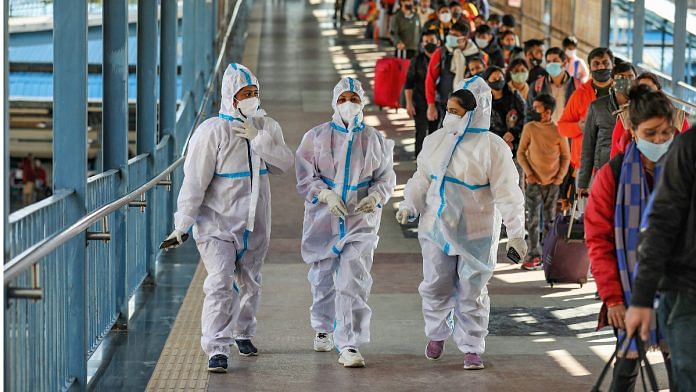Tokyo: The Omicron variant of coronavirus can remain alive on skin for over 21 hours, and more than eights days on plastic surfaces, which may be contributing to its faster spread compared to other strains, according to a study.
The researchers from Kyoto Prefectural University of Medicine in Japan analysed the differences in viral environmental stability between the SARS-CoV-2 Wuhan strain and all variants of concern (VOCs).
The yet-to-be peer-reviewed study, posted recently on the preprint repository BioRxiv, found that the Alpha, Beta, Delta, and Omicron variants exhibited more than two-fold longer survival on plastic and skin surfaces, than the Wuhan strain.
“The high environmental stability of these VOCs could increase the risk of contact transmission and contribute to their spread,” the authors of study said.
“This study showed that Omicron has the highest environmental stability among VOCs, which might be one of the factors that have allowed the variant to replace the Delta variant and spread rapidly,” they said.
The study shows on plastic surfaces, average survival times of the original strain and the Alpha, Beta, Gamma and Delta variants were 56 hours, 191.3 hours, 156.6 hours, 59.3 hours, and 114 hours, respectively.
That compared to 193.5 hours for the Omicron variant, according to the researchers.
On skin samples, average virus survival times were 8.6 hours for the original version, 19.6 hours for Alpha, 19.1 hours for Beta, 11 hours Gamma, 16.8 hours for Delta and 21.1 hours for Omicron, they said.
There was no significant difference in survival times between Alpha and Beta variants, and they had similar environmental stability, which is consistent with the results of previous studies, according to the researchers.
Although Alpha, Beta, Delta, and Omicron variants showed a slight increase in ethanol resistance in response to increased environmental stability, all VOCs on the skin surface were completely inactivated by 15 second exposure to 35 per cent ethanol.
“Therefore, it is highly recommended that current infection control (hand hygiene) practices use disinfectants… as proposed by the World Health Organization,” the researchers added.
The Omicron variant is currently a major concern owing to the rapidly increasing number of infected patients worldwide.
This report is auto-generated from PTI news service. ThePrint holds no responsibility for its content.
Also read: ‘Stealth Omicron’ — how Covid sub-variant with ‘no difference in disease’ got its nickname



